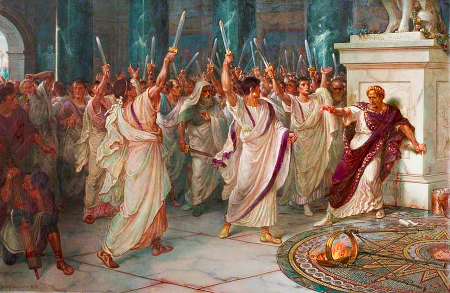Mis-leadership in Shakespeare's Julius Caesar
- Jun Tan
- Apr 7, 2020
- 2 min read

Throughout the play Julius Caesar, Shakespeare juxtaposes the leadership of Brutus to that of Mark Antony. Although both characters are guilty of mis-leadership that contributes to the fall of the Roman Republic, it is clear that Brutus’ actions are rooted in integrity while Antony acts in accordance with his ambition for power.
As the play opens, Brutus is “with himself at war”, having to decide between his love for Caesar and his duty to the Roman Republic. Indeed, he “fears the people/choose Caesar for their king” yet he “loves him well”. Brutus’ utilitarian principles and honourable character are clearly portrayed in how he resolved his dilemma. Ultimately, Brutus chose to lead the conspiracy against Caesar, not because he had “personal cause to spurn at him” (unlike the envious Cassius), but rather because “[he] loved Rome more”. Brutus’ integrity is further emphasised by his determination that the conspirators should be “purgers, not murderers”, resolving to use as little violence as possible. All these virtuous decisions perfectly illustrate how Brutus is indeed “the noblest Roman of them all”.
Despite his noble intentions, Brutus’ integrity results in some mis-leadership. In particular, Brutus refuses to kill Mark Antony along with Caesar, claiming that “Antony is but a limb of Caesar” and therefore not dangerous. This proves to be a fatal error as Mark Antony became the main character responsible for the conspirators’ downfall. Furthermore, Brutus’ naivete is shown when he allows Antony to speak at Caesar's funeral (against Cassius’ advice), enabling Antony to manipulate the plebeians and incite rebellion within the Capitol. It is therefore evident that although Brutus is indeed “an honorable man”, his integrity and his belief in the goodness of people makes him an unwise leader.
In stark contrast, Mark Antony is a character with few principles, who acts out of his own ambition. Indeed, he seizes the opportunity at Caesar’s funeral to consolidate power for himself, fully aware that his actions will “cry havoc and let slip the dogs of war”. In particular, Antony purposefully manipulates the fickleness of the crowd with his oratory rhetorics, encouraging them to “rise and mutiny”. This clearly portrays Antony’s lack of integrity, especially how he asserted outright lies, claiming “[he] spoke not to disprove what Brutus spoke”. Antony’s seemingly harmless words have severe consequences, including the unnecessary and violent death of Cinna the poet.
Moreover, Antony’s selfishness correlates directly with his mis-leadership, as seen when he consents for his nephew to die along with other senators and when he attempts to “cut off some charge” in Caesar’s will. Antony’s irresponsibility is further reflected in his delight at the mayhem in Rome and his illegitimate gain of power. Undoubtedly, Antony is indeed the “masker and reveller” whose lack of integrity, desire for power, and mis-leadership cause utter chaos in the Roman Republic.
Consequently, Shakespeare’s contrast of Brutus and Antony’s leadership in the play enforces a clear message: leadership is not necessarily built on integrity, and mis-leadership often has disastrous outcomes.





Comments